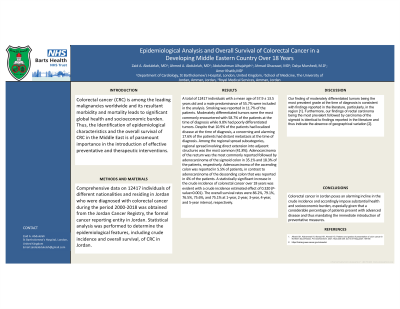Sunday Poster Session
Category: Colon
P0176 - Epidemiological Analysis and Overall Survival of Colorectal Cancer in a Developing Middle Eastern Country Over 18 Years
Sunday, October 22, 2023
3:30 PM - 7:00 PM PT
Location: Exhibit Hall

Has Audio

Zaid A. Abdulelah, MD
St Bartholomew's Hospital
Cambridge, England, United Kingdom
Presenting Author(s)
Zaid A. Abdulelah, MD1, Ahmed A. Abdulelah, MD2, Abdulrahman Alhajahjeh, 3, Ahmad Ghazzawi, MD2, Dalya Murshedi, MD2, Amer Khatib, MD2
1St Bartholomew's Hospital, London, England, United Kingdom; 2School of Medicine, The University of Jordan, Amman, 'Amman, Jordan; 3University of Jordan School of Medicine, Amman, 'Amman, Jordan
Introduction: Colorectal cancer (CRC) is among the leading malignancies worldwide and its resultant morbidity and mortality leads to significant global health and socioeconomic burden. Thus, the Identification of epidemiological characteristics and the overall survival of CRC in the Middle East is of paramount importance in the introduction of effective preventative and therapeutic interventions.
Methods: Comprehensive data on 12417 individuals of different nationalities and residing in Jordan who were diagnosed with colorectal cancer during the period 2000-2018 was obtained from the Jordan Cancer Registry, the formal cancer reporting entity in Jordan. Statistical analysis was performed to determine the epidemiological features, including crude incidence and overall survival, of CRC in Jordan.
Results: A total of 12417 individuals with a mean age of 57.9 ± 13.5 years old and a male predominance of 55.7% were included in the analysis. Smoking was reported in 11.7% of the patients. Moderately differentiated tumors were the most commonly encountered with 58.7% of the patients at the time of diagnosis while 9.8% had poorly differentiated tumors. Despite that 10.9% of the patients had localized disease at the time of diagnosis, a concerning and alarming 17.6% of the patients had distant metastasis at the time of diagnosis. Among the regional spread subcategories, regional spread involving direct extension into adjacent structures was the most common (41.8%). Adenocarcinoma of the rectum was the most commonly reported followed by adenocarcinoma of the sigmoid colon in 35.1% and 18.3% of the patients, respectively. Adenocarcinoma of the ascending colon was reported in 5.5% of patients, in contrast to adenocarcinoma of the descending colon that was reported in 4% of the patients. A statistically significant increase in the crude incidence of colorectal cancer over 18 years was evident with a crude incidence estimated effect of 0.320 (P-value< 0.001). The overall survival rates were 86.2%, 79.1%, 76.5%, 75.6%, and 75.1% at 1-year, 2-year, 3-year, 4-year, and 5-year interval, respectively.
Discussion: Colorectal cancer in Jordan poses an alarming incline in the crude incidence and accordingly impose substantial health and socioeconomic burden, especially given that a considerable percentage of patients present with advanced disease, and thus mandating the immediate introduction of preventative measures.
Disclosures:
Zaid A. Abdulelah, MD1, Ahmed A. Abdulelah, MD2, Abdulrahman Alhajahjeh, 3, Ahmad Ghazzawi, MD2, Dalya Murshedi, MD2, Amer Khatib, MD2. P0176 - Epidemiological Analysis and Overall Survival of Colorectal Cancer in a Developing Middle Eastern Country Over 18 Years, ACG 2023 Annual Scientific Meeting Abstracts. Vancouver, BC, Canada: American College of Gastroenterology.
1St Bartholomew's Hospital, London, England, United Kingdom; 2School of Medicine, The University of Jordan, Amman, 'Amman, Jordan; 3University of Jordan School of Medicine, Amman, 'Amman, Jordan
Introduction: Colorectal cancer (CRC) is among the leading malignancies worldwide and its resultant morbidity and mortality leads to significant global health and socioeconomic burden. Thus, the Identification of epidemiological characteristics and the overall survival of CRC in the Middle East is of paramount importance in the introduction of effective preventative and therapeutic interventions.
Methods: Comprehensive data on 12417 individuals of different nationalities and residing in Jordan who were diagnosed with colorectal cancer during the period 2000-2018 was obtained from the Jordan Cancer Registry, the formal cancer reporting entity in Jordan. Statistical analysis was performed to determine the epidemiological features, including crude incidence and overall survival, of CRC in Jordan.
Results: A total of 12417 individuals with a mean age of 57.9 ± 13.5 years old and a male predominance of 55.7% were included in the analysis. Smoking was reported in 11.7% of the patients. Moderately differentiated tumors were the most commonly encountered with 58.7% of the patients at the time of diagnosis while 9.8% had poorly differentiated tumors. Despite that 10.9% of the patients had localized disease at the time of diagnosis, a concerning and alarming 17.6% of the patients had distant metastasis at the time of diagnosis. Among the regional spread subcategories, regional spread involving direct extension into adjacent structures was the most common (41.8%). Adenocarcinoma of the rectum was the most commonly reported followed by adenocarcinoma of the sigmoid colon in 35.1% and 18.3% of the patients, respectively. Adenocarcinoma of the ascending colon was reported in 5.5% of patients, in contrast to adenocarcinoma of the descending colon that was reported in 4% of the patients. A statistically significant increase in the crude incidence of colorectal cancer over 18 years was evident with a crude incidence estimated effect of 0.320 (P-value< 0.001). The overall survival rates were 86.2%, 79.1%, 76.5%, 75.6%, and 75.1% at 1-year, 2-year, 3-year, 4-year, and 5-year interval, respectively.
Discussion: Colorectal cancer in Jordan poses an alarming incline in the crude incidence and accordingly impose substantial health and socioeconomic burden, especially given that a considerable percentage of patients present with advanced disease, and thus mandating the immediate introduction of preventative measures.
Disclosures:
Zaid A. Abdulelah indicated no relevant financial relationships.
Ahmed A. Abdulelah indicated no relevant financial relationships.
Abdulrahman Alhajahjeh indicated no relevant financial relationships.
Ahmad Ghazzawi indicated no relevant financial relationships.
Dalya Murshedi indicated no relevant financial relationships.
Amer Khatib indicated no relevant financial relationships.
Zaid A. Abdulelah, MD1, Ahmed A. Abdulelah, MD2, Abdulrahman Alhajahjeh, 3, Ahmad Ghazzawi, MD2, Dalya Murshedi, MD2, Amer Khatib, MD2. P0176 - Epidemiological Analysis and Overall Survival of Colorectal Cancer in a Developing Middle Eastern Country Over 18 Years, ACG 2023 Annual Scientific Meeting Abstracts. Vancouver, BC, Canada: American College of Gastroenterology.
